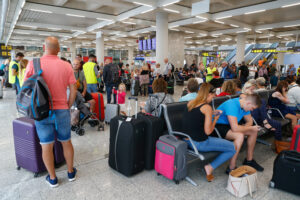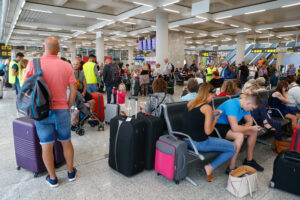
Next week will see the official break up for all schools in the UK for the long awaited six-week summer holiday. However, whilst many are hoping to head abroad for their first foreign summer break since the onset of the COVID-19 pandemic, the looming summer of discontent may have other ideas.
With airline strikes, flight cancellations, missing luggage, staff shortages and queues at nearly every UK airport, the summer of travel chaos will hit the UK hard, and it now seems almost impossible to avoid. Alberto Lopez Valenzuela, Founder & CEO, alva asks how has the UK’s transport sector seemingly imploded and where will it end?
Union boom
2022 has become the year of the union boom, and nowhere does this seem truer than the UK transport sector. With the threat of more tube and rail strikes still rumbling on, Ryanair, easyJet and BA staff are predominantly striking over working conditions and pay cuts that were ordered during the height of the pandemic.
Yet with weeks of travel chaos about to hit the UK population, it is clear at this stage that public sentiment towards the strikes will continue to descend as the array of different union actions continue. The knock-on effect is already significant damage to the reputation of the industry as a whole – damage that may take years to rebuild.
Additionally, the travel sector will lose vital revenue, making it even harder to afford pay increases, and travellers and businesses will become increasingly aggravated as they take the brunt of it all. The sector is already battling with what seems like a different daily crisis as it struggles to stay afloat of the demands of the peak summer season. Heathrow has just announced a daily cap of 100,000 passengers until September 11th and up to 1,000 more flight cancellations. It is likely other airports will follow with their own heavy-handed restrictions.
But will the vast level of strike action that will impact almost every airport in the UK be successful or cause further reputational damage for all involved? There is no denying that a company’s brand is tainted by issues surrounding workers’ pay structures and working conditions. It harms corporate reputations, employee engagement and the crucial recruitment drive. Additionally social media will ensure that everything is played out in real life and at lightning speed. But with the threat of more strike action throughout the summer months, is the transport sector at risk of causing more reputational damage that could set it back decades?
Communicating with passion
The strike action levied by staff at the major airlines has had the major benefit of being on the front foot with consistent and dramatic messaging. easyJet staff in Spain want the same pay as their European counterparts – their strike action will still impact UK consumers as a vast majority of easyJet flights in the summer head to Spain daily. Meanwhile, BA’s ground staff are striking over their 10% pay cut from the pandemic which has never been reinstated, as well as BA’s controversial ‘fire and rehire policy’ which they say is rife.
GMB has been scathing in the language they have used, accusing the airline of offering ‘crumbs’ of the money that was ‘stolen’ from hard working employees. Ryanair staff want a ‘change of attitude from the airline’ alongside guarantees of better working conditions, they have also specifically called on the Spanish government to ensure Ryanair does not violate labour legislation or staff’s constitutional rights.
Meanwhile, it seems the airlines have struggled to communicate with the same force and passion that their staff and union reps have. They have made it clear that they are against strike action and are trying to solve the issues, but this is a line that has lost impact as the inevitability of strike action and airport chaos has grown.
Underlying the strike action is a wider movement created by the pandemic that has seemingly impacted the UK transport sector the most. The Great Resignation has created a significant shift in the employee / employer relationship that has left employers scrambling to retain and attract talent, not aided by the sector laying off 30,000 skilled staff at the height of the COVID-19 crisis.
The jobs market has been overhauled and now employee confidence is at an all-time high. New job openings have meant that if employees are unhappy where they work, there may be more options to move elsewhere to gain the pay and conditions they might expect. For this reason, employee engagement has never been more important within a corporate structure.
What became clear earlier this year is that this is exactly what employees in the UK transport sector, particularly the aviation division, have been doing. Many were lured away by better pay, better conditions, and less stress, not just by rival firms but also by completely different sectors all together. The inability to compete against this backdrop has created a huge staff shortage not seen in modern times, and training requirements that simply couldn’t be met by the hectic summer schedule because they couldn’t persuade employees to sign on the dotted line.
Roadmap to stability
The UK public needs to see decisive visibility from its transport leaders, with the same passion the union reps are showing. They need to see communication that shows them that everything is being done to stop more strike action and travel upheaval – what is the roadmap out of this? More visibility is needed by the industry’s leaders in coming forward to reassure the public that they are doing everything they can to find a solution to head off the travel chaos.
To survive the summer of union action, the different players involved will need to adopt a secure strategy to manage losses, maintain productivity, crucially uphold reputation and retain the employer-employee dynamic. Reputationally, it’s clear now that for the UK’s aviation sector things could not be worse.
The stakes are high, and the onus is on travel leaders to show that they are doing absolutely everything that they can to stop this continued disruption throughout 2022 – or they will face severe reputational impact for any indecisiveness.
Read more:
Summer of travel chaos: what next?

